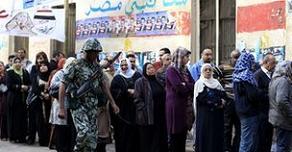Egyptians are casting their ballots for the second day, with turnout so far described as "very high".
 Egyptians are casting their ballots for the second day, with turnout so far described as "very high".
Egyptians are casting their ballots for the second day, with turnout so far described as "very high".
On Tuesday, polls opened again, a day after voters across the country waited in long queues on Monday to vote for a new parliament -- the start of multi-stage elections.
But the arrival of people on Tuesday was a trickle rather than the deluge seen the day before.
In the capital, Cairo, thousands of voters flocked to schools on Monday in the neighborhoods of Zamalek, Nasr City and Maadi - among others - well before polling booths opened at 8am, to stake their place in line.
However, logistical problems continued to plague many polling stations across the country, with some voters reporting that stations had not opened more than an hour after the time scheduled, as ink used to mark voters' fingers had not arrived.
 The formerly banned Muslim Brotherhood is expected to emerge as the largest power, but without a majority, when results for the new lower house of parliament are published on January 13.
The formerly banned Muslim Brotherhood is expected to emerge as the largest power, but without a majority, when results for the new lower house of parliament are published on January 13.
The group’s Freedom and Justice Party described the first day of polling as a "joyous day, unprecedented in the history of Egyptian people who continue to write their future in a way that amazed the world."
But it suggested turn-out might be lower than the level the long queues of enthusiastic voters suggested.
According to exit polls conducted by its own observers, turnout was between 30 to 32 percent in the areas of the country that voted, with 27 percent of voters casting their ballots in the capital Cairo.
The backdrop to the vote was marred by violence, after a week of protests calling for the resignation of the interim military rulers who stepped in at the end of Mubarak's 30-year rule. Forty-two were killed and more than 3,000 injured.
Protesters had again occupied Tahrir Square in Cairo last week, the epicenter of protests against Mubarak, but this time they were calling for the resignation of Marshal Field Mohammad Hussein Tantawi and his fellow generals.
